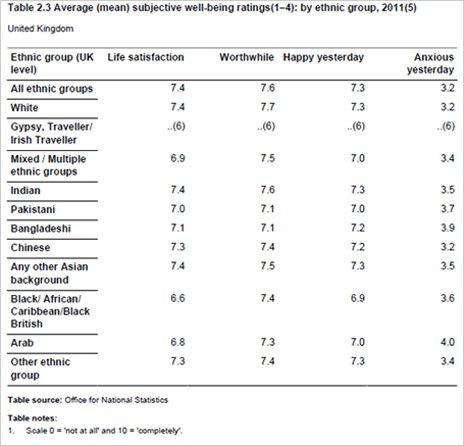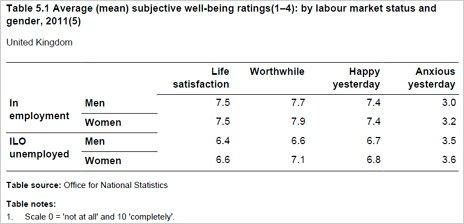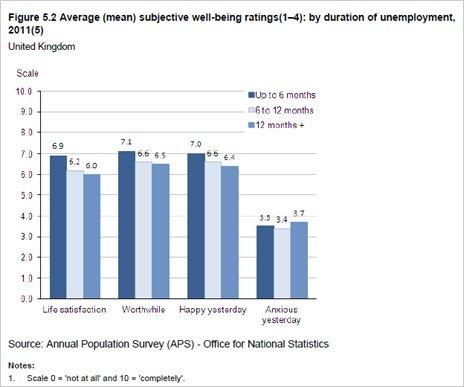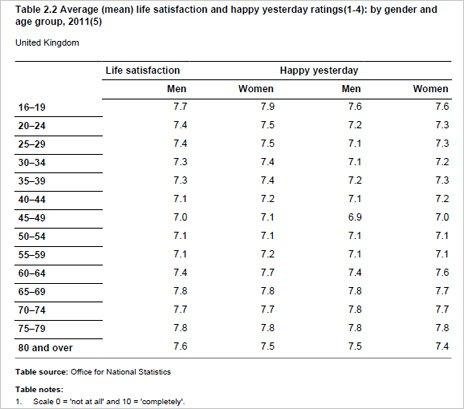Jobs, retirement and race: What the well-being data tells us
- Published
- comments

If David Cameron is serious about using official well-being data to decide government policy, today he got some pointers as to where his priorities might lie.
Improving Britain's general happiness may mean (among other things) focusing on policies around unemployment, the retirement age and racial equality.
The Office for National Statistics has just published results from the largest ever official well-being survey in the UK, external - 80,000 adults were asked about their general life satisfaction, how worthwhile they thought their life was, how happy or anxious they felt the previous day.
The large sample means it is possible to look at relatively small minority groups within the population and see how their answers compare with the average.
I was particularly struck by the correlations between ethnicity and well-being, in this table.

Black Britons, it would appear, are significantly less satisfied with their lives than the general population - a score of 6.6 out of 10 compared with a national average of 7.4. Similarly, the data reveal a significantly lower score on the measure asking respondents how happy they were yesterday - 6.9 compared with 7.3.
But the story of ethnic difference extends to other groups as well.
People from mixed or multiple ethnic groups are also less satisfied with their lives (6.9 compared with 7.4) while those with Pakistani or Bangladeshi heritage tend to say they were more anxious the previous day (3.7 - 3.9 compared with 3.2). The Indian population, while pretty similar in terms of other measures to the average, also indicates a slightly higher level of anxiety (3.5/3.2).
The reasons for these results are not easy to pin down. They may be influenced by the income, education or employment patterns within different ethnic groups. There may be an element of discrimination or prejudice at play. Migration itself, particularly if someone is leaving family and friends, can be linked to stress and depression. But equally it may that there are cultural differences in the way people respond to questions from pollsters.
Nevertheless, it would seem that pushing up Britain's overall well-being score will require us to think hard about the life experience of minority ethnic groups.
The well-being data also tells us some interesting things about the importance of work…and retirement.
It comes as no surprise to see that unemployment lowers people's life satisfaction and increases anxiety, a finding particularly strong among men.

What is more, it appears that the longer someone is out of work, the more unhappy and anxious they become.

This chart shows that someone who has been without a job for a year or more has a life satisfaction score of just 6 compared with the UK average of 7.4. Work really matters to well-being.
But it would seem that retirement is also a boost to well-being. We have known that happiness is smile-shaped for decades - we tend to be relatively contented in our youth and become progressively grumpy into middle-age before recovering our sense of humour as our hair turns grey.

What is noticeable to me is the jump between 55-59-year-olds and those in retirement.
On both satisfaction and happiness measures, men see their score leap from 7.1 to 7.8 when they pass 65. For women, who usually retire a little earlier, the leap happens when they reach 60.
It would be a mistake to try and draw too much from this table. Government plans to raise the retirement age may have no affect on the well-being of the nation. They may even increase it.
But it will be interesting to see whether the satisfaction and happiness scores drop when the changes are made. And if they do, on David Cameron's watch, will he think again?